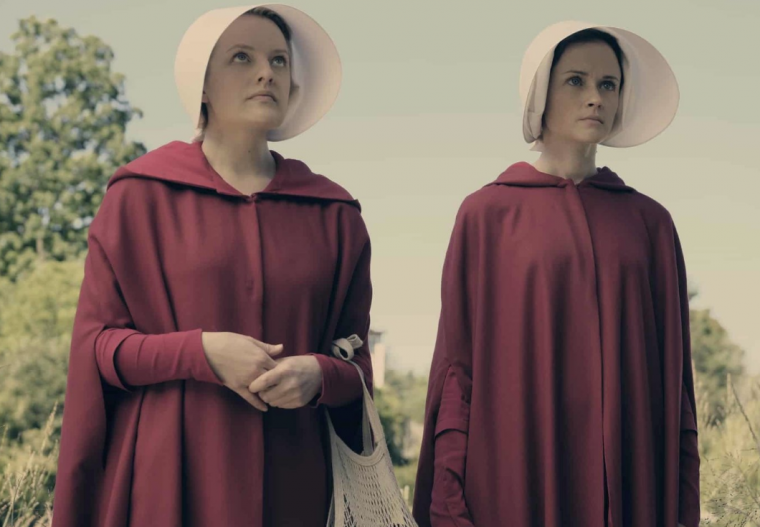Why The Handmaid's Tale is more Christian than you think
Margaret Atwood's famous novel The Handmaid's Tale shocked and cattle-prodded its way onto our screens in 2017. Series two will air its fifth episode this Sunday, on Channel 4. Although a slight departure from Atwood's original, The Handmaid's Tale follows the journey of June Osbourne, or Offred as she is known to her 'commander', as she attempts to leave America and the forces of the Gilead regime.

The God-fearing dystopia in which The Handmaid's Tale is set categorises women by their ability to bear children. The fertile 'handmaids' provide children for the wives of the commanders and leaders, who are often unable to have their own children. In return for this 'gift', the handmaids are offered a life without suffering. Or so they say.
In December 2017, David Robertson asked Christian Today readers to avoid watching this 'ugly' and 'anti-Christian' drama. He has a point. The series, although compelling watching, is not representative of the Christianity that many of us know. It must be noted however, that despite the familiar language – eg the greeting 'blessed be the fruit' and scripture references – allusions to Jesus, the salvation or messianic ideas are minimal. It is, after all, a work of fiction.
So, what is it exactly that draws readers back each week? And particularly, why do young women, including Christian ones, find it so captivating? A plotline so heavily focused on oppression has found itself nestled into the prime Channel 4 spot that also hosts My Big Fat Gypsy Wedding and Big Brother.
One explanation can be found in the appropriation of the striking red 'habits' – a word in itself used in appropriation – of the handmaids. The Irish abortion referendum saw women from Belfast to Dublin donning the floor-length scarlet cloaks and white, winged bonnets as a demonstration of their beliefs. While a 'commander' is not forcing them to bear children in his name, they believe that the state, in its abortion ban, forced them to carry unwanted children to term. In the era of the 'Me Too' movement and the gender pay gap revelations, handmaids stand for the ever-continuing journey that women face as they strive for equality.
Characters have stood out in this role. Of course June, in her many acts of defiance, demonstrates a resilience that stands up to oppression and injustice. Her care for the other women acts to strengthen the sisterhood. She does not let Janine kill herself out of desperation to keep her baby. Similarly, Ofglen, who ousts her commander for raping her, is seen as a defiant and resilient character. The witness of these women and their resistance to the regime is empowering for viewers. It is a demonstration of both kindness and resilience.
On the other hand, while the striking imagery of The Handmaid's Tale has been used outside the Golden Globes and sexual harassment trials, the message that the plot promotes is otherwise aligned. The systematic abuse of the handmaids is not pro-women and it is not Christian. However, one could argue a sense of Christian messaging coming through. It is difficult to deny ideas of the gift and blessing of new lives. The wives yearn for children, doing all that they can (and using extremely questionable means) to do so. We see a marked change in wives who have children, including their treatment of the handmaids that bring this life into the world.
In the first series we see Janine coddled (and possibly prayed over) as she goes through labour. After giving birth, Offred (June) declares that Janine has been given a level of safety and relief, as a woman who has borne a child can never be Unwoman. Similarly, although in more sinister circumstances, in the current series, Aunt Lydia (the Mother Superior of the handmaids, if you will) reminds June that regardless of her rebelliousness, she is immune from punishment while pregnant. As June escapes we see her cradle her bump and talk about wanting to care for the baby inside her. While this may involve a stretch of analysis, it could be argued that The Handmaid's Tale has a streak of the pro-life running through it. Is this the message the producers envisaged?
The Handmaid's Tale, and particularly the current series, is an entertaining sequence of jump-scares and excitement. Most viewers are watching for this reason. However, we cannot ignore the difficult topics that are covered. The Christian perspective is a contentious one. To see familiar teaching displayed in repressive, dangerous and abusive ways is difficult, and we know it is unacceptable. However, Christians see these teachings in a different light, primarily through the prism of salvation – a theme not covered in either the novel or television series. But along with everyone else, we tune in, waiting for the day of deliverance for these defiant, feminist handmaids.
Nina Mattiello Azadeh studied music and philosophy and was a Faith in Politics media intern in 2016. She has a keen interest in interfaith relations, social action and is a classical ballet dancer. Follow her on Twitter @Ninamataz











